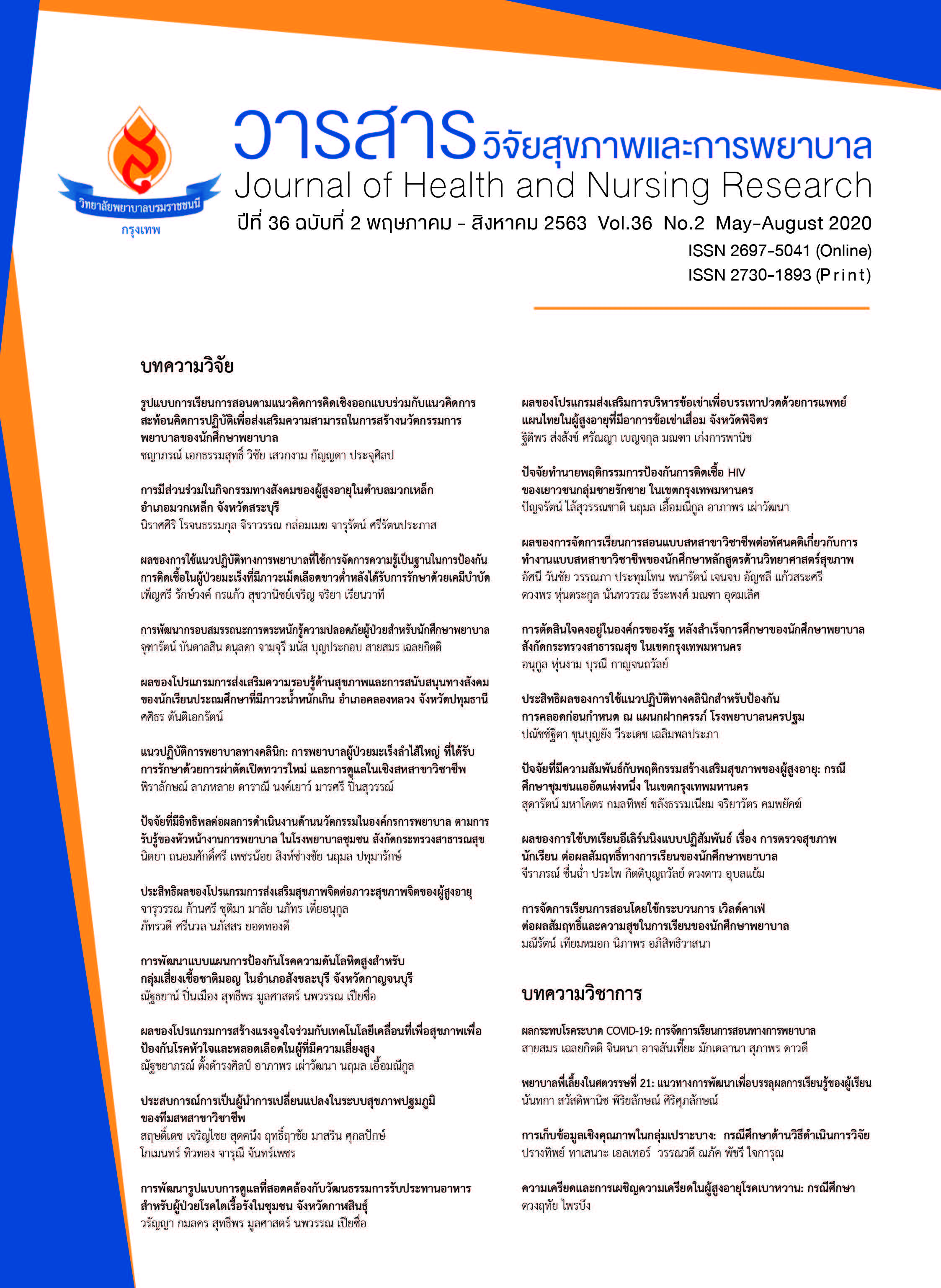ผลของการจัดการเรียนการสอนแบบสหสาขาวิชาชีพต่อทัศนคติเกี่ยวกับการทำงานแบบสหสาขาวิชาชีพของนักศึกษาหลักสูตรด้านวิทยาศาสตร์สุขภาพ
คำสำคัญ:
การจัดการเรียนการสอนแบบสหสาขาวิชาชีพ, ทัศนคติเกี่ยวกับการทำงานแบบสหสาขาวิชาชีพ, นักศึกษาหลักสูตรด้านวิทยาศาสตร์สุขภาพบทคัดย่อ
การวิจัยกึ่งทดลองนี้มีวัตถุประสงค์เพื่อเปรียบเทียบทัศนคติเกี่ยวกับการทำงานแบบสหสาขาวิชาชีพก่อนและหลังเข้าร่วมโปรแกรมการจัดการเรียนการสอนแบบสหสาขาวิชาชีพของนักศึกษาหลักสูตรด้านวิทยาศาสตร์สุขภาพ กลุ่มตัวอย่าง ได้แก่ นักศึกษาหลักสูตรพยาบาลศาสตรบัณฑิต วิทยาลัยพยาบาลบรมราชชนนี พุทธชินราช วิทยาลัยพยาบาลบรมราชชนนี อุตรดิตถ์ และนักศึกษาหลักสูตรสาธารณสุขศาสตรบัณฑิต และหลักสูตรการแพทย์แผนไทย วิทยาลัยการสาธารณสุขสิรินธร จังหวัดพิษณุโลก ปีการศึกษา 2562 จำนวน 47 คน เครื่องมือที่ใช้ในการวิจัย ประกอบด้วย 1) โปรแกรมการจัดการเรียนการสอนแบบสหสาขาวิชาชีพ 2) แบบวัดทัศนคติเกี่ยวกับการทำงานแบบสหสาขาวิชาชีพเป็นมาตรวัดทัศนคติเกี่ยวกับการทำงานกับสหสาขาวิชาชีพของนอริสและคณะ วิเคราะห์ข้อมูลโดยใช้สถิติความถี่ ร้อยละ ค่าเฉลี่ย ส่วนเบี่ยงเบนมาตรฐาน และสถิติที
ผลการวิจัย พบว่า หลังเข้าร่วมโปรแกรมการจัดการเรียนการสอนแบบสหสาขาวิชาชีพ นักศึกษามีคะแนนทัศนคติเกี่ยวกับการทำงานแบบสหสาขาวิชาชีพโดยรวมสูงกว่าก่อนเข้าร่วมโปรแกรมฯ อย่างมีนัยสำคัญทางสถิติ (p<.001) เมื่อพิจารณารายด้านพบว่าคะแนนทัศนคติเกี่ยวกับการทำงานแบบสหสาขาวิชาชีพทุกด้านสูงกว่าก่อนเข้าร่วมโปรแกรมฯ อย่างมีนัยสำคัญทางสถิติ โดยมีค่าเฉลี่ยเพิ่มขึ้น เรียงตามลำดับรายด้าน ได้แก่ 1) การยึดผู้ป่วยเป็นศูนย์กลาง 2) การทำงานเป็นทีม บทบาทและความรับผิดชอบ 3) การเคารพความหลากหลายทางวัฒนธรรมและคุณธรรม 4) ความมีอคติกับสหสาขาวิชาชีพ และ 5) การยึดชุมชนเป็นศูนย์กลางตามลำดับ (p<.001) โปรแกรมการจัดการเรียนการสอนแบบสหสาขาวิชาชีพนี้ สามารถนำไปประยุกต์ใช้สำหรับนักศึกษาหลักสูตรด้านวิทยาศาสตร์ทุกชั้นปี และขยายผลการจัดการเรียนการสอนแบบสหสาขาวิชาชีพ โดยเปิดโอกาสให้นักศึกษาหลักสูตรอื่น ๆ เช่น แพทย์ เภสัชกร นักกายภาพบำบัดเข้ามาร่วมกิจกรรมด้วยเพื่อให้เกิดการเรียนรู้ร่วมกันเพิ่มขึ้น
Downloads
เอกสารอ้างอิง
2. Buring SM, BhushanmA, Broeseker A, Conway S, Duncan-Hwewitt W, Hansen L, Westberg S. Interprofessional education: Definitions, student competencies, and guidelines for implementation. Am J Pharm Educ 2009;73(4):1-8.
3. Anderson ES. Evaluating interprofessional education: An important step to improving practice and influencing policy. J Taibah Univ Medical Sci 2016;11(6):571-78.
4. Reeves S. Why we need interprofessional education to improve the delivery of safe and effective care. Interface (Botucatu) 2019;20(56):185-96.
5. Roslan NS, Yusoff M, Rahim AF, Hussin ZA. Together we stand, divided we fall: Interprofessional collaborative practice competencies from Malaysian medical professionals’ perspectives. J Taibah University Med Sci 2016;11(6):533-40.
6. World Health Organization. Framework for action on interprofessional education & collaborative practice. [Internet]. 2010. [Cited 2020 April 2]. Available from https://apps.who.int/iris/bitstream/ handle/10665/70185/WHO_HRH_HPN_10.3_eng.pdf;jsessionid=6A28A816395BA060149F309FB855 D5F9?sequence=1
7. National Health Professional Education Foundation. Interprofessional education—IPE. [Internet]. 2010. [Cited 2020 April 2]. Available from https://www.pharmacy.mahidol.ac.th/newsfile/ depdocument/pdf
8. Guinan EM, Barrett EM, Neill F, Grimes T, Sullivan D. Attitudes to interprofessional education among health science students engaging in a multidisciplinary workshop series. Int J Health Sci Educ 2018;5(1):1-10.
9. Norris J, Lassche M, Joan C, Eaton J, Guo J, Pett M, Blumenthal D. The development and validation of the interprofessional attitudes scale: Assessing the interprofessional attitudes of students in the health professionals. Academic Medicine 2015;90:1394-400.
10. Ruebling I, Pole D, Breitbach AP, Frager A, Kettenbach G, Westhus N, Kienstra K, Carlson J. A comparison of student attitudes and perceptions before and after an introductory interprofessional education experience. J Inter Care 2013;28(1):23-7.
11. Lim D, Noble-Jones R. Interprofessional education (IPE) in clinical practice for pre-registration nursing students: A structured literature review. Nurs Educ Today 2018;68:218-25.
12. El-Awaisi A, Anderson E, Barr H, Wilby KJ, Wilbur K, Bainbridge L. Important steps for introducing interprofessional education into health professional education. J Taibah University Med Sci 2016;11(6):546-51.13. Roberts LD, Davis MC, Radley-Crabb HG, Broughton M. Perceived relevance mediates the relationship between professional identity and attitudes towards interprofessional education in first-year university students. J Interprof Care 2018;32(1):33-40.
14. Tran C, Kaila P, Salminen H. Conditions for interprofessional education for students in primary healthcare: a qualitative study. BMC Med Educ 2018;18(122):1-8.
15. Stetten NE, Black EW, Edwards M, Schaefer N, Blue AV. Interprofessional Service-learning experiences among health professional students: A systematic search and review of learning outcomes. J Interprof Educ & Pract 2019;15:60-9.
16. Reeves S. Why we need interprofessional education to improve the delivery of safe and effective care. Interface (Botucatu) 2019;20(56):185-96.
17. Mishoe SC, Tufts KA, Diggs LA, Blando JD, Claiborne DM, Hoch JM, Walker ML. Health professions students’ Attitudes toward teamwork before and after an interprofessional education co-curricular experience. J Res Interprof Prac & Educ 2018;8(1):1-16.
18. Yuenyow T, Howharn C, Promsuan W. Effects of interprofessional education on perception on interprofessional roles and responsibility, and teamwork. J Nurs Public Health & Educ 2018;20(1):137-47. (in Thai)
19. Sarakshetrin A, Sriyasak A, Ketin V, Rongmuang D. A development of interprofessional education learning model for health promotion among the elderly in the community. J Health & Nurs Res 2019;35(2):140-52. (in Thai)
20. Green BN, Johnson CD. Interprofessional collaboration in research, education, and clinical practice: working together for a better future. J Chiropr Educ 2015;29(1):1-10.
ดาวน์โหลด
เผยแพร่แล้ว
รูปแบบการอ้างอิง
ฉบับ
ประเภทบทความ
สัญญาอนุญาต
บทความที่ได้รับการตีพิมพ์ เป็นลิขสิทธิ์ของวารสารวิจัยสุขภาพและการพยาบาล (วิทยาลัยพยาบาลบรมราชชนนี กรุงเทพ) ไม่สามารถนำไปตีพิมพ์ซ้ำในวารสารฉบับอื่น


















